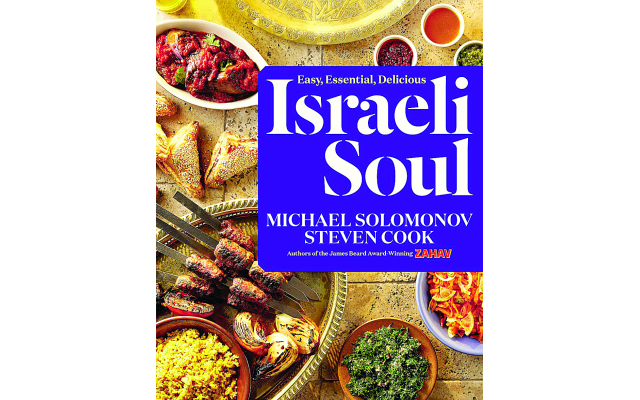Israeli Soul is Mouthwatering and Emotional
By Authors: Michael Solomonov and Steven Cook
After 37 years with the Atlanta Journal-Constitution and now with the AJT, , Jaffe’s focus is lifestyle, art, dining, fashion, and community events with emphasis on Jewish movers and shakers.
It’s a travelogue, a photographic masterpiece, a mouthwatering adventure, all rolled into cookbook, “Israeli Soul: Easy Essential, Delicious,” by famed chef-restaurateurs Michael Solomonov and Steven Cook. The book showcases toothless, tanned faces, bowls, bones, beans and sparkling views of Israeli seas.
Solomonov’s acclaimed Philadelphia restaurant, Zahav, is standing the test of time as a unique dining destination in a fickle industry.
Israel just turned 70; Zahav turned 10. What’s unique about the chefs’ appearance at the Book Festival of the MJCCA Friday, Nov. 16, is a kosher buffet pre-Shabbat lunch ($25) prepared by local caterer, A Kosher Touch.
On the personal side, Solomonov revealed in The Inquirer in 2014 that his brother was killed on patrol on the Lebanese border about 10 years earlier. Other articles headline “From Humus to Heroine” or “From Crack to James Beard (Award),” detailing his double life abusing drugs.
Not one to linger through cookbooks, I found this one an emotional photographic journey. Well-cataloged as falafel (Balls of Gold, Old Akko, page 28), shawarma grilling, soups, sabich, bakery, and ice box barely scratches the surface of the choices and compelling backgrounds. Food is used to bridge heritage. Solomonov dispels the common misconception that Israeli food equals “The Middle East.” The authors have done the research to highlight the best of the best.

If you think you are well-versed in Israeli cuisine, imagine a meal of Soom tahini, kubaneh, jachnun, Libyan squash, Yemenite-style veal osso buco, yeasted rugelach, and Druze mountain bread. The latter instructs how to invert an everyday wok over a gas burner and spread the mixture over the dome. An exotic segment was devoted to Zalatimo, an Arabic folded sugar dough dessert passed down from King Herod, now served outside the Church of the Holy Sepulchre.
I asked Solomonov about his latest cookbook and community action.
Jaffe: Why is this book different than your earlier ones?
Solomonov: This one is less definitive. For hummus, instead of boiling and draining chickpeas, we start with a simple can plus a jar of tahini, garlic and seasoning. No measuring, very little clean up.
Jaffe: You’ve visited Atlanta before. How would you describe our vibe?
Solomonov: Atlanta is a cultural blast! It’s a culinary and cultural destination. All the traffic complaints are typical of any city.

Jaffe: What was unusual about the production of the book?
Solomonov: Each one of the 100 recipes was tested in my tiny one-bedroom apartment!
Jaffe: How does your Tikkun Olam project work?
Solomonov: All the profit from my other restaurant, The Rooster, goes to fund food at the Broad Street Ministry (in Philly), where we serve a hundred quality meals a week on nice linens.
Jaffe: You have a special empathy for recovering addicts and the homeless?
Solomonov: I have been honest and outspoken about my own addiction and recovery. I continue to participate in programs that work for me. ■
Author’s note: For a fascinating 10 minutes, view “CBS Sunday Morning,” (Nov. 12, 2017) for a segment on Solomonov. I’ll never forget it.
Solomonov will share his recipes at the Book Festival 12 p.m. Nov. 16.




comments